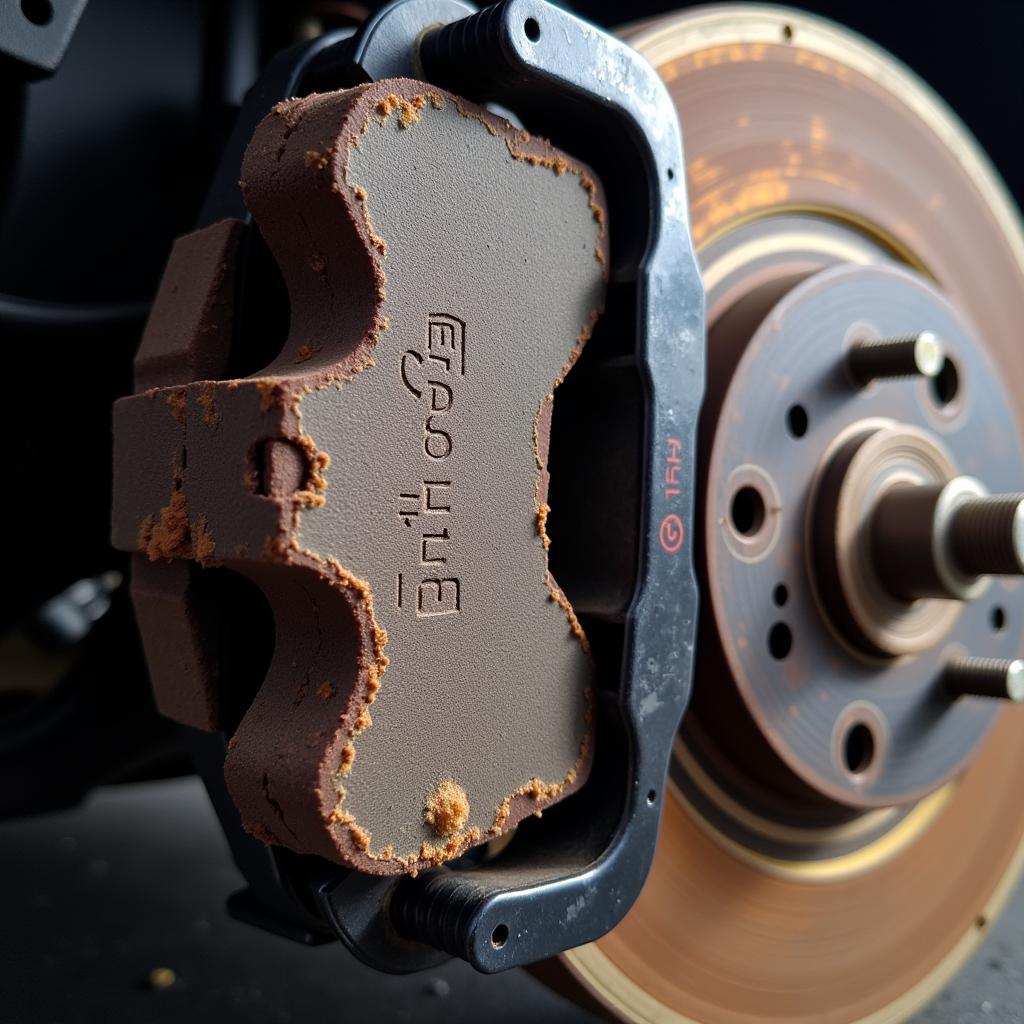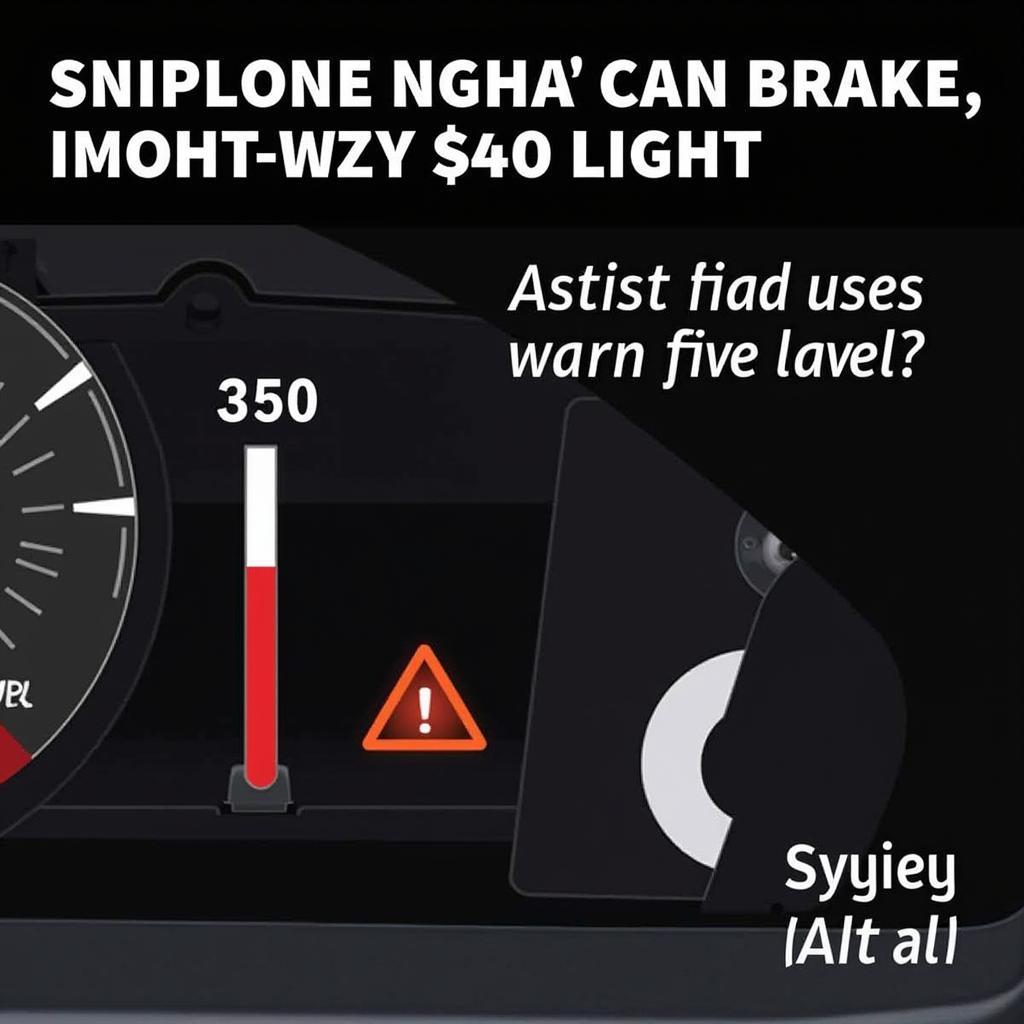Experiencing a temporary brake warning light on your Prius dashboard can be unnerving. While this warning doesn’t always signal a critical problem, it’s crucial to understand what might be causing it and take appropriate action. This article delves into the common reasons behind a “Prius temporary brake warning” and provides guidance on how to address them.
Understanding Your Prius’s Braking System
Before diving into the causes, it’s helpful to have a basic understanding of how the Prius’s braking system works. Unlike traditional gasoline vehicles, the Prius utilizes a regenerative braking system in conjunction with conventional hydraulic brakes. When you press the brake pedal, the regenerative braking system engages first, using the electric motor to slow the vehicle and recharge the battery. If additional braking force is required, the hydraulic system kicks in.
Common Causes of a Temporary Brake Warning
A temporary brake warning on your Prius dashboard can be triggered by various factors, ranging from minor issues to more significant problems:
1. Low Brake Fluid Level
One of the most common culprits behind a temporary brake warning is low brake fluid. Brake fluid is essential for transmitting force from the brake pedal to the brake calipers, which squeeze the brake pads against the rotors, slowing or stopping the vehicle. If the fluid level drops too low, it can compromise braking performance and trigger the warning light.
2. Worn Brake Pads
Brake pads naturally wear down over time due to friction. As the pads thin, the brake system needs more fluid to operate effectively. This can lead to a drop in the fluid level and activate the brake warning light.
3. Malfunctioning Brake Light Switch
The brake light switch is a small component responsible for turning on the brake lights when you press the pedal. If this switch malfunctions, it can disrupt the signal to the brake lights and potentially trigger the brake warning light on your dashboard.
4. Issues with the Regenerative Braking System
As mentioned earlier, the Prius relies on a regenerative braking system to recapture energy during braking. If there’s a problem with the regenerative braking system, such as a faulty sensor or control module, it can trigger the brake warning light.
5. Software Glitches
Modern vehicles like the Prius are heavily reliant on software. Occasionally, a software glitch can occur, leading to false readings and triggering warning lights, including the brake warning.
Troubleshooting a Temporary Brake Warning
If you encounter a temporary brake warning on your Prius:
- Safely pull over. Find a safe location to park your vehicle.
- Check the brake fluid level. Refer to your owner’s manual for instructions on locating the brake fluid reservoir and check the fluid level. If it’s low, adding brake fluid might temporarily resolve the issue. However, it’s crucial to get your vehicle inspected by a qualified mechanic to determine the underlying cause of the low fluid level.
- Inspect the brake lights. Ensure all brake lights are functioning correctly. If you notice any issues, it could indicate a problem with the brake light switch.
- Consult a Professional. If the brake warning light persists or you suspect a more serious issue, it’s best to consult a qualified mechanic specializing in Toyota Prius vehicles. They can use diagnostic tools to pinpoint the exact cause of the warning and recommend the appropriate repairs.
Remote Diagnostics and Software Solutions
In some instances, the “Prius temporary brake warning” might stem from a software-related issue. Modern vehicles often receive software updates to address bugs, improve performance, and enhance safety features.
warner electric centrifugal brake fc-g0c410 plays a crucial role in the braking system.
If a software glitch is suspected, connecting your Prius to a remote diagnostic tool can help identify and resolve the problem.
“Remote diagnostics and software updates are becoming increasingly common in the automotive industry,” says John Smith, a senior automotive engineer specializing in Toyota hybrid systems. “These technologies allow us to diagnose and address many vehicle issues remotely, providing a convenient and efficient solution for car owners.”
Preventing Future Brake Warnings
While not all brake warnings are preventable, there are measures you can take to minimize their occurrence:
- Regular Maintenance: Adhering to the recommended maintenance schedule in your Prius owner’s manual is crucial. This includes routine brake inspections, fluid flushes, and brake pad replacements.
- Mindful Driving: Aggressive driving habits, such as hard braking and accelerating, can accelerate brake pad wear. Adopting smoother driving techniques can help prolong the life of your brakes.
- Address Warning Lights Promptly: Ignoring any warning light on your dashboard can lead to more significant problems down the road. Address warning lights promptly to prevent potential safety hazards and costly repairs.
Conclusion
A temporary brake warning on your Toyota Prius should never be ignored. While it could indicate a minor issue like low brake fluid, it could also signal a more significant problem requiring immediate attention. By understanding the common causes, taking appropriate troubleshooting steps, and seeking professional assistance when needed, you can ensure the safety and reliability of your Prius’s braking system.


